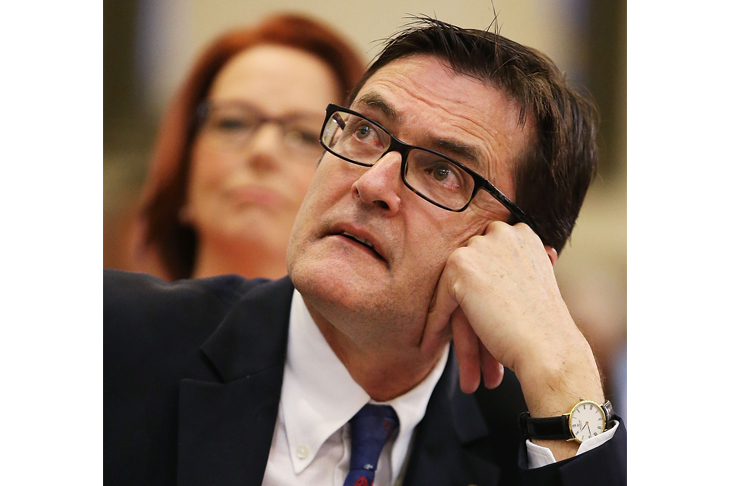The claim that Australia’s system of compulsory superannuation is the envy of the world is routinely made. But who is making the assertion? It is definitely the envy of the world for the super fund managers and the large group of hangers-on whose livelihoods depend on the system. For them, it’s a business model that doesn’t get much better. The government mandates that a certain percentage of workers’ pay is routed into superannuation and the arcane features of our industrial relations system, coupled with widespread worker indifference, mean that the industry super funds are the big winners.
These funds have an equal representation of unions and employer associations. The trustees that govern these funds are appointed rather than elected by the members. There is no requirement to comply with the tedious governance procedures that listed companies must follow, such as providing a remuneration report which is put to a vote.
There is essentially no accountability that the members can impose on the trustees to ensure that the decisions taken are in keeping with the members’ preferences.
In theory, government regulation provides an important brake on trustees by stipulating that superannuation funds exist for the sole purpose of maximising the retirement incomes of members. The sole purpose test should constrain the trustees from veering into funding activities that are not related to maximising retirement incomes.
In practice, the enforcement of the test by the regulator – the Australian Prudential Regulation Authority – has been weak and patchy. The funding of advertising, sponsorships and assorted activities has generally escaped serious scrutiny.
The funding of the New Daily, an online newspaper, by several large industry super funds, goes back to 2013. At that time, these funds, which included the largest, AustralianSuper, decided to invest in a new media website that would cover ‘news, finance, entertainment and lifetstyle’.
Each fund contributed over one million dollars as startup capital and made their member data bases available to the website to market the product. Bruce Guthrie, a former editor of the Age and Herald-Sun, who was appointed editorial director, acknowledged that the venture was unlikely to turn a profit for three to five years. The chairman of the New Daily board, Garry Weaven, explained that the New Daily is ‘an important part of the wider efforts of our network to build the generic industry super fund brand in Australia, as well as provide a platform for individual funds to market themselves. A secondary objective is to provide a reliable free news service to members, including easy-to-understand stories around superannuation and financial management’.
As a member of AustralianSuper at the time, I wrote to the chair, Heather Ridout, seeking an explanation for this extraordinary investment that had nothing to do with maximising members’ retirement incomes. Her unsatisfactory response included the information that the money for the investment was being sourced from the administration fees paid by members and was not being deducted from their investment contributions. This begged the question why members wouldn’t be better off with lower administration fees rather than having the money wasted in a tangential and unjustified investment. (AustralianSuper has significantly jacked up administration fees in recent years.)
As events panned out, all the super funds that provided the initial capital did their dough and in 2015-16, the ownership of the New Daily was transferred to Industry Super Holdings for zero consideration.
ISH is a private company owned by a number of industry super funds and ‘provides services to industry super funds and fund members and manages equity and debt portfolios’. ISH is chaired by former federal Labor minister, Greg Combet.
The precise details of the financial performance of the New Daily are not clear, although the venture has racked up considerable losses, regularly required additional capital and still fails to make a profit.
Since the transfer of ownership to ISH, the New Daily has burnt through close to $13 million in accumulated losses. In 2019-20, the website lost $2.8 million, with expenses in excess of $3 million and revenue of just over $200,000. In August 2019, there was a new issuance of 4.2 million $1 shares taken up by ISH.
A commercial arrangement entered into with digital publisher, Eric Beecher, means that any additional revenue the website earns doesn’t translate into net profits for the venture for many years.
As Tony Boyd of the Australian Financial Review wryly observed, ‘Beecher is really the only person making money out of big super’s muddled media foray… [He] is entitled to an increasing share of the ad revenue as the ad revenue has risen’.
Unsurprisingly, the industry super funds have sought to defend the investment in this dubious media outlet, citing a readers’ survey that found, ‘77 per cent of respondents said that it improved their understanding of financial issues’.
Cath Bowtell, the chair of the New Daily, (who previously worked for the ACTU and ran as a Labor candidate for the seat of Melbourne in 2013) has declared that ‘readership is growing rapidly, revenue is growing each year and it is on many measures highly successful – most importantly, improving the financial literacy of the readers and engaging superannuation members with their funds and savings’.
The paywall-free website is a mishmash of news stories (including material from the ABC), popular culture (think the Kardashians), general finance articles extolling the virtues of industry super funds and strident opinion pieces from grumpy, left wing former mainstream media columnists. It looks like a well-paid retirement home for overwhelmingly male journalists. Think Paul Bongiorno, Michael Pascoe, Dennis Atkins, Gary Linnell and Alan Kohler.
As for improving the financial literacy of the readers, it’s a joke. The articles are necessarily general as the website cannot legally provide specific financial planning advice. The full range of financial options – setting up a self-managed superannuation scheme for example – is rarely canvassed. It’s more propaganda than information.
The key issue is how the industry super funds either directly, and now indirectly through ISH, have been able to get away with this investment that, on any reasonable interpretation, is a clear violation of the sole purpose test that applies to all superannuation funds. Bowtell thinks that the fact that the venture loses money is okay because no mainstream media organisation in Australia is making money but this makes the venture unsustainable.
In the meantime, APRA must demonstrate that it is capable of ensuring that industry super funds and external entities (ISH maintains that it is not a super fund so is not subject to APRA oversight) meet the sole purpose test rather than embarking on self-serving frolics that are unrelated to maximising retirement incomes.
Got something to add? Join the discussion and comment below.
Get 10 issues for just $10
Subscribe to The Spectator Australia today for the next 10 magazine issues, plus full online access, for just $10.
You might disagree with half of it, but you’ll enjoy reading all of it. Try your first month for free, then just $2 a week for the remainder of your first year.












Comments
Don't miss out
Join the conversation with other Spectator Australia readers. Subscribe to leave a comment.
SUBSCRIBEAlready a subscriber? Log in